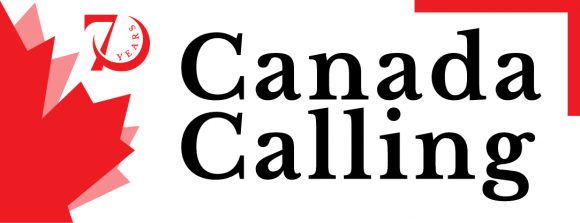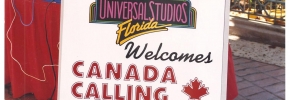Prior Smith’s popular radio program keeps visiting Canadians informed.
If you had been reading the Toronto Telegram 47 years ago, you might have noticed a story about a Canadian broadcaster who was beginning a program aimed at Canadians visiting Florida.
The content would be about what was going on in Canada.
The broadcaster, Dave Price, had come to the conclusion that Canadian news was largely ignored by the U.S. media, and that there was a perfect opening for someone broadcasting news from back home to all those Canadians wintering in the Sunshine State.
The show caught on and it hasn’t gone off the air since.
Price was the host for about the first 23 years.
Smith, in Tampa to broadcast from this year’s Florida State Fair – as he has done for the last 16 years – talked with Mature Times about the show’s history, its appeal and its success.
He said that Price had come to Fort Lauderdale in 1948 to cover Maple Leaf baseball spring training. He searched in vain for hockey scores from back home and complained about the lack of Canadian sports and news available.
Some of his cohorts, reminding him that he was, after all, a broadcaster, suggested that he do it himself. The idea grew, and, in 1954, Price began Canada Calling with two stations: one in Miami and one in Tampa (WFLA-AM). “Back then, that was the Canadian tourist market – the Gold Coast and the Bay Area,” Smith said.
The show was an instant hit with visiting Canadians.
“Dave and his wife, Kate, ran the show for about 23 years,” Smith said, “and it was unbelievably successful.”
As for Smith, he was a well-known newsman with dominant Toronto radio station CFRB, where he had been since 1969. He was sent to Florida to cover a couple of stories in the mid-70’s, and tuned in to Canada Calling while he was in the state.
By that time, he said, Price was “in ill health”, and the show had lost some of its luster. “The radio business had passed him by,” Smith said. “I decided to give him some competition.”
About the same time, Price decided to sell the program, and “another fellow bought it,” Smith said.
He went head-to-head against that other fellow, and his network grew to “twice the size of the original,” Smith said. Price’s original network soon faded away, and Smith found himself with no competition.
He began identifying his show by saying, “This is the Canadian News with Prior Smith,” since his name was well-known among Canadians.
But, listeners soon began calling him “Mr. Canada Calling,” and they continued to do so the first 12 years his show was on the air. “I gradually re-introduced the Canada Calling name. I’ve carried on the tradition,” he said.
The show has “never missed a day in 47 years,” he said.
Smith never met the man in whose footsteps he followed. However, in his first season on the air, 1977-78, he was in Pompano Beach, when he received a message that Dave Price had called him. “I called him up,” Smith said, “and we had a lengthy chat. He was dead two weeks later.”
Smith began with four stations in 1977. He now has a 27 station network and 30 corporate clients. Following the expanding Canadian tourist trek, some of those stations are in south Texas, some are in central Arizona.
For the first 10 years, he kept his news job at CFRB, but “eventually, something had to give,” he said, noting that he finally left the radio station in 1988. “This thing was more than I could handle.”
His potential market is the more than 2 million Canadians who visit Florida every year, “bringing with them some $1.5 billion in tourist dollars annually). In addition, a number of non-Canadian Floridians tune in, just to hear what’s happening with their Northern neighbor.
Canada Calling airs even days a week, from the first Monday in November until Easter weekend. During that time, Smith leaves his home in Canada to do 36 remotes. When he’s not on location, he broadcasts from a state-of-the-art studio built in his log home on Clear Lake in Peterborough, Ontario.
It’s truly a family affair. Smith said that his wife, Allana, handles “the business side of the business,” from 2,000 miles away when Smith is in Florida, and son Tim handles the Canada Calling website (www.canadacalling.com).
When his broadcast season ends, Smith takes a quick breather, but he said that “within two weeks, I’m back putting the next season together again. It takes the whole summer to do it.
Smith, 56, takes a highly personal approach to the show. He personally visits all the sponsors and potential sponsors each season, assuring them that the quality of the broadcast is being maintained.
For some sponsors, he said, renewals are relatively simple matters: “Publix has been a sponsor for over 40 years,” he said. “It’s easy dealing with people like that – one phone call.”
“Ninety-nine percent of the business comes to me,” he said. “I never have to hard-sell.”
As for the website, Smith talks proudly about his son’s investment of time and energy in the project.
“About six years ago my son, who was 14 at the time, was taking computer classes at school.”
Dinner table conversation turned to websites, just coming into vogue for businesses. Smith admitted that he was clueless about setting one up. “My son said, “I’ll do it for you,” Smith said. “About an hour later, he said, “Do you want to see your website?”
Smith said it has remained virtually the same ever since that first evening. “I haven’t got a clue how he does it,” he said. “…I don’t know much about it. But, like the Yellow Pages, I figure I’ve got to be there,”
The format for the broadcasts “hasn’t changed in 24 years,” Smith said. Six days a week, the reports are 5 minutes long. On Sundays, there’s a 15-minute weekly wrap-up.
Smith said he rises about 5:15 in the morning, updating material from the night before. He records about 6 and is usually done by 7 a.m., he said. “It’s uplinked three times starting at 8:15,” he said, distributed in this state by Florida Radio Networks, based in Orlando.
He finishes breakfast, takes the dog for a walk. (My English setter keeps me in shape”), and from about 9 to 3:30 he deals with “other aspects of the business.” In the evenings, he begins prep work for the next morning’s broadcasts.
The program is done in a conversational style that has reminded more than one listener of famed American newsman and commentator Paul Harvey. Smith, who said he has never met Harvey, is honored by the comparison. “I love it,” he said.
He said he thinks Harvey’s broadcasts are so immensely popular because he “talks to the listeners,” not at them, and he said he hopes his show comes across the same way.
He said he doesn’t know how many people actually listen to the program, but he thinks he has a pretty good fix on what sort of folks they are.
The so-called “senior seniors,” coming down from Ontario long-term, now are “only about 7 percent of the total market) of Canadian visitors, he said, “but they are the core audience of what I do.”
Core, maybe, but not majority, he said.
“The much larger audience are people in their late 30s, 40s, 50s, who come down with their kids,” At 10:30, he said, they’re listening to WGUL (860 AM and 106.3 FM). “Grandmother and Grandfather tune in, a hush falls over the room; and grandparents, son daughter, spouse, kids, they’re all listening.”
Smith said the “changing tourist pattern” of Canadian visitors has been largely ignored by the U.S. media. “The demographics…changed dramatically,” he said, to “commuting- type” visitors as opposed to long-term stays. The long-term stay has declined dramatically, but the frequency of trips has dramatically increased over the last eight or nine years, he said.
———————–
That all translates into a huge audience for Canada Calling.
But as time-consuming as the show is, Smith has a couple of other irons in the fire as well.
Twelve years ago, he began a newspaper travel column that appears weekly in papers all across Canada, including the Toronto Star, the Montreal Gazette, the Ottawa Citizen and the Halifax Chronicle Herald, among others.
“In 24 years,…I’ve traveled every inch of the state,” Smith said. “I know every back road there is. I know the state better than 99 percent of the people who’ve been here all their lives.”
And so he writes about the state for the Canadians who will visit Florida and those who are just armchair travelers.
He writes about major and not-so-major tourist attractions, recommends golf courses and restaurants, talks about big cities and quaint villages.
“My favorite spot in Florida,” he wrote earlier this year, is “Mount Dora, a 30-minute drive north and west of downtown Orlando. The town is wall-to-wall antique shops and trendy restaurants. The jewel of Mount Dora is the century-old Lakeside Inn. The Inn’s Beauclaire dining room is one of the best dining spots in Florida. Nestle into one of the old rocking chairs on the front veranda and watch the sun set over Lake Dora. This is what vacation memories are made of.”
Another recent column asks readers,”…want to walk the best beach in Florida? Spend a day or two in the Florida Panhandle and visit Grayton Beach State Park, between Destin and Panama City. This is what all Florida beaches used to look like before many of them were lined with condos.”
And in his March 3 column, he wrote, “in Tampa the hottest spot in town these days is the restored historic Latin district known as Ybor City. Over the past few years, millions of dollars have been spent to bring the old cigar-making district and its many social clubs back to life…”
———————–
Steve Schurdell is managing partner of WGUL, which has carried Canada Calling in the Bay area for most of the last two decades.
He said that Smith’s commitment and the shows longevity just can’t be beat.
“I’ve seen the power of the Canada news program,” he said. “It’s a very popular show.”
Schurdell said that his station sponsors a number of community events – health fairs and similar activities. WGUL is often broadcast over the PA system in the background at those events.
“We’ve been in a room with lots of people bustling around, a big crowd milling about,” when Canada Calling comes on the air, he said.
“It’s just like the old Merrill Lynch TV commercials,” he said. “Within 30 seconds, you could hear a pin drop. Everyone stops to listen to the show. It’s really amazing.”
Steve Hill – Excerpts from “Tampa Tribune“




 Prior Smith honoured on June 26, 2013 alongside Senator Bob Graham at the Florida Association of Broadcasters Convention in Miami Beach! Check out the video below!
Prior Smith honoured on June 26, 2013 alongside Senator Bob Graham at the Florida Association of Broadcasters Convention in Miami Beach! Check out the video below!

What time and what station can we receive Canada calling. Thank you
The station listing is listed right at the top of the main page of the website under STATION LISTING.
Alternatively, click this link.